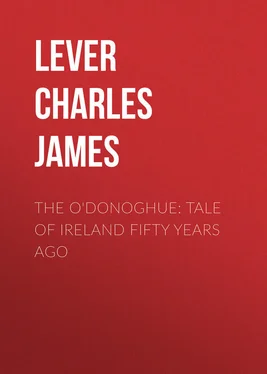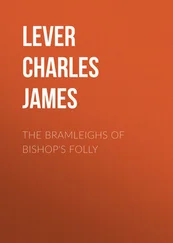Charles Lever - The O'Donoghue - Tale of Ireland Fifty Years Ago
Здесь есть возможность читать онлайн «Charles Lever - The O'Donoghue - Tale of Ireland Fifty Years Ago» — ознакомительный отрывок электронной книги совершенно бесплатно, а после прочтения отрывка купить полную версию. В некоторых случаях можно слушать аудио, скачать через торрент в формате fb2 и присутствует краткое содержание. Издательство: Иностранный паблик, Жанр: literature_19, foreign_antique, foreign_prose, на английском языке. Описание произведения, (предисловие) а так же отзывы посетителей доступны на портале библиотеки ЛибКат.
- Название:The O'Donoghue: Tale of Ireland Fifty Years Ago
- Автор:
- Издательство:Иностранный паблик
- Жанр:
- Год:неизвестен
- ISBN:нет данных
- Рейтинг книги:4 / 5. Голосов: 1
-
Избранное:Добавить в избранное
- Отзывы:
-
Ваша оценка:
- 80
- 1
- 2
- 3
- 4
- 5
The O'Donoghue: Tale of Ireland Fifty Years Ago: краткое содержание, описание и аннотация
Предлагаем к чтению аннотацию, описание, краткое содержание или предисловие (зависит от того, что написал сам автор книги «The O'Donoghue: Tale of Ireland Fifty Years Ago»). Если вы не нашли необходимую информацию о книге — напишите в комментариях, мы постараемся отыскать её.
The O'Donoghue: Tale of Ireland Fifty Years Ago — читать онлайн ознакомительный отрывок
Ниже представлен текст книги, разбитый по страницам. Система сохранения места последней прочитанной страницы, позволяет с удобством читать онлайн бесплатно книгу «The O'Donoghue: Tale of Ireland Fifty Years Ago», без необходимости каждый раз заново искать на чём Вы остановились. Поставьте закладку, и сможете в любой момент перейти на страницу, на которой закончили чтение.
Интервал:
Закладка:
“Is the ‘Lodge’ burned down?” said Lanty, whose interest in the inhabitants had a somewhat selfish origin.
“No, they got the fire tinder. I saw a wild-looking devil mount one of the ricks, with a great canvas sail all wetted, and drag it over the burning stack – and before I left the place, the Lodge was quite safe.”
“I’m sorry for it,” said Mary, with a savage determination. “I’m sorry to the heart’s core. Luck nor grace never was in the glen, since the first stone of it was laid – nor will be again, till it is a ruin! Why didn’t they lay it in ashes, when they were about it?”
“Faith, it seemed to me,” said Talbot, in a low soft voice, “they would have asked nothing better. I never saw such bull-dogs in my life. It was all you could do, Flahault, to call them off.”
“True enough,” replied Jacques, laughing. “They enjoy a brisée like that with all their hearts.”
“The English won’t stay long here, after this night,” was Lanty’s sage reflection, but one which he did not utter aloud in the present company. And then, in accordance with Jacques’ request, he proceeded to explain by what different tenants the Lodge became occupied since his last visit; and that an English baronet and his daughter, with a household of many servants, had replaced Hemsworth and his few domestics. At every stage of the recital, Flahault stopped the narrative, to give him time to laugh. To him the adventure was full of drollery. Even the recollection of his wounded comrade little damped his enjoyment of a scene, which might have been attended by the saddest results; and he chuckled a hundred times over what he suspected the Englishman must feel, on this, his first visit to Ireland. “I could rob the mail to-morrow, for the mere fun of reading his letters to his friends,” said he. “ Mort bleu! what a description of Irish rapparrees, five hundred in number, armed with pikes.”
“I wish ye’d gave him the cause to do it,” said Mary, bitterly – “what brings them here? who wants them? or looks for them?”
“You are right, Mary,” said Talbot, mildly. “Ireland for the Irish!”
“Ay, Ireland for the Irish!” repeated Mary and Lanty; and the sentiment was drank with all the honours of a favoured toast.
For some time the party continued to discuss Flahault’s story, and calculate on every possible turn the affair might give rise to. All agreeing, finally, on one point, that Sir Marmaduke would scarcely venture to protract his stay in a country, where his visit had been signalized by such a reception. The tone of the conversation seemed little to accord with Captain Jacques’ humour, whose convivial temperament found slight pleasure in protracted or argumentative discussions of any kind.
“ Que le diable l’importe ,” cried he, at last. “This confounded talk has stopped the bottle this half-hour. Come, Talbot, let’s have a song, my lad; never shake your head, mon enfant, – Well, then, here goes.”
Thus saying, Flahault pushed back his chair a little from the table, and in a rich deep bass voice, which rung through the high rafters of the cabin, chanted out the following rude verses, to a French vaudeville air – giving the final e of the French words, at the end of each line, that peculiar accentuation of a – which made the word sound contrabanda!
Though this information as to Captain Jacques’ performance seems of little moment, yet such was the fact, that any spirit the doggerel possessed could only be attributed to the manner of the singer, and the effect produced by the intonation we have mentioned.
A bumper, “mes enfans,” to swallow your care,
A full bumper, we pledge, “a L’Irlande;”
The land of “belles femmes” – le pays de bonne chere,
“Et toujours de la Contrabande.”
Some like to make love, and some like to make war,
Some of beauty obey “la commande;”
But what is a glance from an eye, “bleu,” or “noir,”
Except it be, “la Contrabande.”
When a prince takes the cash that a peasant can’t spare,
And lets him lie down “sur la lande;”
Call it, as you like – but the truth is, I swear,
“C’est bien pire que – la Contrabande.”
Stolen kisses are ever the sweetest, we’re told,
They sink like a “navire qui fende;”
And what’s true of a kiss, is the same, too, of gold,
They’re both, in their way, “Contrabande!”
When kings take your money, they won’t even say,
“Mon ami le Dieu vous le rende;”
While even the priest, for a blessing takes pay,
“C’est partout et toujours, Contrabande.”
The good things of life are not equal, I’m sure,
Then, how pleasant to make the “amende;”
To take from the wealthy, and give to the poor,
“Voila! que j’appelle, Contrabande.”
Yet, as matters go, one must not deem it strange,
That even “La France et L’Irlande,”
If good wishes and friendship they simply exchange,
There are folks who call that, “Contrabande.”
“ Vive la Contrabande, mes amis ,” shouted out Jacques, as he arose glass in hand, and made the room ring with the toast. And every voice repeated the words, in such imitations as they were able.
“‘Tis an elegant song, any way,” said Lanty, “if one only understood it all – and the tune’s mighty like the ‘Cruiskeen Lawn.’”
“Well, Harry,” said Flahault, slapping his friend on the shoulder, “will the song persuade you to turn smuggler? I fear not. You’d rather practise your own ‘Contrabande’ among the bright eyes and dark locks of the capital. Well, there are worse ‘metiers.’ I have had a turn at it these fifteen years, and whether on the waters of Ontario, or Champlain, or scudding along under the fog-banks of the Scheldt, I never grew weary of it. But, now for a little business talk – where is the Padre? where’s Father Luke? was he not to have been here to-night?”
Mary whispered the answer in the captain’s ear.
“ Ah! parbleu ,” exclaimed he aloud – “is it so? Practising a little ‘Contrebande’ of his own – trying to see a poor fellow safe over the frontier, into the next world.”
“Fie for shame, Captain Jacques,” said Mary, with pious horror. “That’s not the way to talk of the holy offices.”
“I wish I had old Maurice Dulang here, the priest of Trois Rivières, he’s the boy could despatch them without trouble.”
Neither Lanty nor Mary gave any encouragement to Flahault’s new turn of the conversation, and so, addressing himself to Talbot, he went on —
“We were dining together one day, at the little inn at Trois Rivières, when a messenger came from Lachégon, for the Père to administer the last rites to a ‘mourant.’ Maurice promised to be there in half-an-hour, but never stirred – and though three other messengers came for him, the answer was all the same – until, at last came word, ‘ Cest trop tard, il est mort .’
“‘ Trop tard! ’ said Maurice, ‘not a bit of it; give me a pen and ink, and some paper.’ With that he folded a piece, note fashion, and wrote —
“‘Mon cher Pierre – Fais ton petit possible pour cet pauvre diable, qui s’est glissé hors du monde sans mes soins. Apparement il était bien pressé; mais tu l’arrangera pour le mieux.
“‘Ton viel ami.’
“‘Maurice Dulang. “‘St. Pierre, à la Conciergerie au Paradis.’
“‘Put that in his mouth,’ said Maurice, ‘and there’s no fear of him.’”
Читать дальшеИнтервал:
Закладка:
Похожие книги на «The O'Donoghue: Tale of Ireland Fifty Years Ago»
Представляем Вашему вниманию похожие книги на «The O'Donoghue: Tale of Ireland Fifty Years Ago» списком для выбора. Мы отобрали схожую по названию и смыслу литературу в надежде предоставить читателям больше вариантов отыскать новые, интересные, ещё непрочитанные произведения.
Обсуждение, отзывы о книге «The O'Donoghue: Tale of Ireland Fifty Years Ago» и просто собственные мнения читателей. Оставьте ваши комментарии, напишите, что Вы думаете о произведении, его смысле или главных героях. Укажите что конкретно понравилось, а что нет, и почему Вы так считаете.












